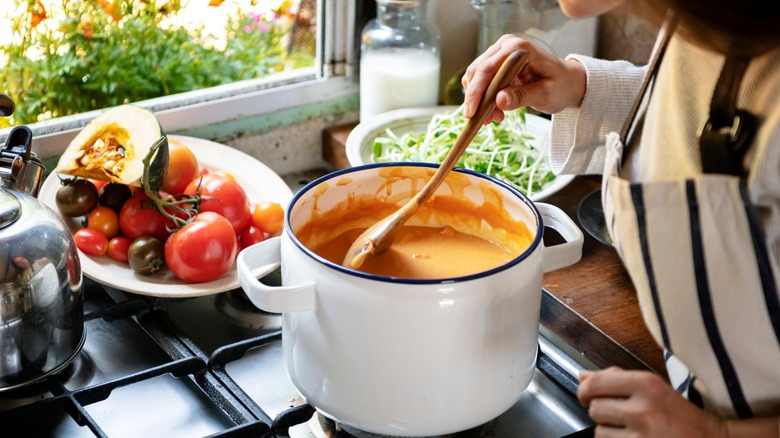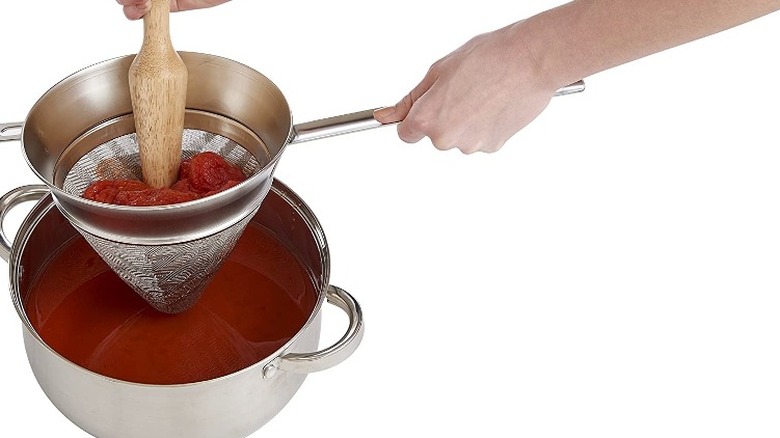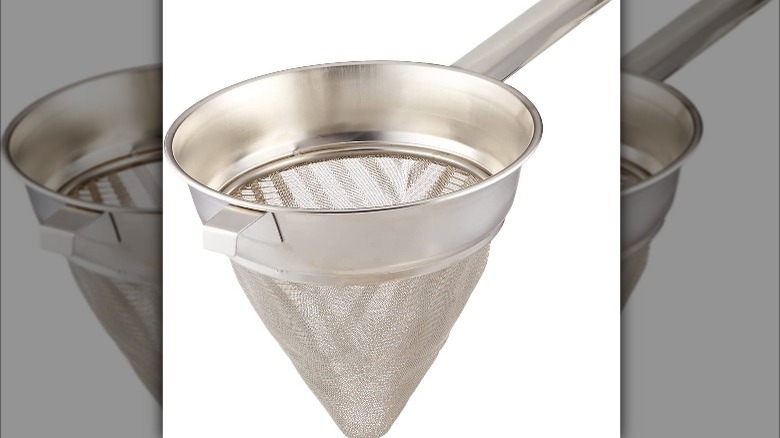Chinois: The Kitchen Tool For Perfectly Smooth Soups And Sauces
A metal chinois may be one of the most versatile cooking tools available, but it's one that seems to see more use in professional rather than home kitchens. Getting its name from the French word for Chinese, the chinois or china cap is a cone-shaped fine-mesh strainer that is reminiscent of the hats worn by Chinese immigrants during the 1800s.
Passé though the name is, a chinois has a long handle with one or a pair of hooks on the opposite side, used for hanging over a bowl, pot, or accompanying stand. Most chinois also come with a pointed wooden pestle used to fully strain sauces, soups, and broths, leaving behind any seeds, herbs, or other particles. Though a wooden spoon or the back of a ladle will get the job done in a pinch, no matter what utensil is used with it, the chinois is a remarkably useful tool.
Chinois helps make sauces and soups smooth
Watch nearly any episode of "Top Chef," and you'll see at least one contestant pulling out a chinois to finish off a sauce. And there's a very good reason for that. Using a chinois guarantees a silky, smooth finish for whatever liquid is passed through it. It will remove any bone or meat fragments from a homemade chicken or beef stock to produce a clear broth. Sometimes a chinois is called a bouillon strainer because of how well it does this job.
Any sauce thickened with flour can become unpleasantly lumpy, but that problem is easily fixed after it goes through the chinois. The same goes for egg-based sauces, such as hollandaise, which can form clumps that need to be strained out. It's also great for taking out all the seeds from tomatoes for a soup or sauce.
The chinois also has many sweet applications as well. It can deliver some of the smoothest fruit purees and sauces. The little seeds of a raspberry are no match for the chinois, making it the ideal tool when making raspberry jam or jelly. Dessert fillings like lemon curd also benefit from a trip through this special strainer, resulting in a soft, creamy sauce.
Other uses for a chinois
While the chinois is strongly associated with soups and sauces, it can perform a number of other tasks as well. Chef Nick Tamburo explained to Eater that "You can use a chinois for everything you would use a colander for, plus so much more." So when you're colander is dirty, and it's time to drain the pasta or rinse off some berries, feel free to reach for the clean chinois on the shelf. A chinois can also be used in place of cheesecloth when making yogurt or homemade ricotta cheese because of its fine mesh. Some turn to a chinois when making almond or nut-based milks because it neatly separates the liquid from the nut solids. Bakers might also find the chinois useful as a spare sifter.
If the chinois sounds appealing to you, there are a number of different-sized versions available. The price tag on this kitchen tool also varies, ranging from around $25 on Amazon to nearly $100 for this model from Sur la Table.


